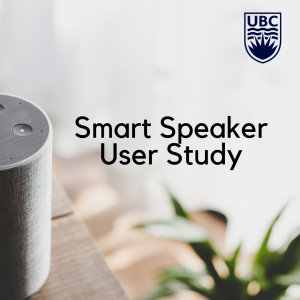

Researchers: Yue Huang, Borke Obada, and Konstantin Beznosov
A smart speaker is the most popular IoT device adopted in people’s homes. Users can carry out a number of activities in their homes by making use of smart speakers to interact with other smart devices, such as requesting for Uber rides, making purchases, setting the thermostat, and controlling house lights. Moreover, as Amazon has introduced more than 50,000 Alexa skills into smart speakers, additional features can be accessed, such as listening to TED Talks, playing games, and keeping up with the latest sports news. According to the 2019 Voicebot Smart Speaker Consumer Adoption Report, 26% of U.S. adults reported having a smart speaker, which is approximately 66 million people in total. Moreover, Gartner predicts that 75% of U.S. households will have smart speakers by 2020.
Although smart speakers have many desirable features, these devices have numerous privacy and security issues. Many studies and news reports have revealed some of the vulnerabilities of smart speakers, e.g., weak voice authentication and 24/7 listening and recording. In addition, the recent features of Alexa (calling and messaging) have raised a number of security and privacy concerns among users. Furthermore, it has been demonstrated that devices with voice interfaces can be controlled by voice commands that are unintelligible to human listeners. Users’ privacy and security concerns regarding the use of smart speakers have also been studied. The identified concerns include device hacking, recording of private conversations, 24/7 listening activities, data collection, sharing, storage, and the creepy nature of the devices.
Because more than a quarter of U.S. households now own a smart speaker, there is a need to explore users’ privacy and security concerns in this particular scenario and provide support to improve their experiences. Since many research studies simply focus on investigating users’ concerns with respect to external entities and few studies shed light on users’ concerns toward other users live in one household. We aim to bridge this knowledge gap by studying and comparing users’ mental models, privacy concerns, and coping strategies toward both insiders and outsiders of the household. The exploration of users’ experiences with shared smart speakers could help researchers discover the underlying issues with the current design of smart speakers, thereby informing the future design of these devices.
We therefore investigate:
- Users’ mental models of their shared smart speakers within the household, and the factors influencing the device adoption.
- Users’ security and privacy concerns when making use of shared smart speakers in a multi-user scenario, and how these concerns differ from those geared towards third parties.
- The mitigation strategies users employ to address the concerns, and how the strategies differ from those toward third parties.